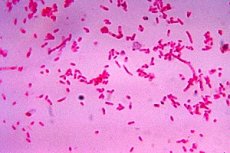Nye publikasjoner
Kreftutvikling kan være knyttet til fusobakterier
Sist anmeldt: 02.07.2025

Alt iLive-innhold blir gjennomgått med medisin eller faktisk kontrollert for å sikre så mye faktuell nøyaktighet som mulig.
Vi har strenge retningslinjer for innkjøp og kun kobling til anerkjente medieområder, akademiske forskningsinstitusjoner og, når det er mulig, medisinsk peer-evaluerte studier. Merk at tallene i parenteser ([1], [2], etc.) er klikkbare koblinger til disse studiene.
Hvis du føler at noe av innholdet vårt er unøyaktig, utdatert eller ellers tvilsomt, velg det og trykk Ctrl + Enter.

Forskere har oppdaget en av variantene av Fusobacterium – Fusobacterium nucleatum – i annenhver kolorektal svulst. Denne mikroorganismen er ganske vanlig i menneskekroppen og finnes i munnhulen hos friske mennesker. Nå er en viss type av denne bakterien assosiert med økt risiko for tilbakefall av svulster og metastase, samt med en ugunstig prognose for overlevelse etter behandling. Slike resultater ble kunngjort av representanter for det amerikanske F. Hutchinson Cancer Center.
Tykktarmskreft regnes som en svært vanlig ondartet patologi med skade på tykktarmen eller endetarmen. Blant de vanligste kliniske symptomene er tarmdysfunksjon og blod i avføringen. Diagnosen stilles på grunnlag av informasjon innhentet under koloskopi. Hovedbehandlingsmetoden er kirurgisk fjerning av det berørte tarmsegmentet, etterfulgt av cellegift. Sykdommen rammer oftest eldre mennesker - fra femti år og oppover.
Tykktarmskreft er den nest hyppigste dødsårsaken blant voksne (data fra American Cancer Society for USA).
Ved hjelp av metagenomisk sekvensering har spesialister identifisert kolonier av Fusobacterium nucleatum-bakterier i kolorektale kreftlesjoner. Interessant nok er disse mikroorganismene vanligvis tilstede i den orale mikrofloraen.
Forskerne studerte kolorektale svulstvev tatt fra to hundre opererte pasienter, og målte samtidig tilstedeværelsen av fusobakterier i dem. Som et resultat ble fenotypisk og genetisk heterogenitet hos disse mikroorganismene avdekket. Det viste seg at fusobakterier er delt inn i to typer: C1, som lever i munnhulen, og C2, som dominerer i vev av kolorektale ondartede neoplasmer.
Bakterier i kategori C2 ble funnet i nesten annenhver prøve av kolorektal kreft. I tillegg ble et stort antall slike mikroorganismer sådd i avføringselementer hos pasienter med denne sykdommen. Dette fenomenet var nært forbundet med økt dynamikk i ondartet lesjonsvekst, tidlig tilbakefall av neoplasmer og dannelse av metastaser, samt en lite lovende terapeutisk prognose.
Ifølge eksperter spiller det en viktig rolle å identifisere ulike typer fusobakterier og bestemme involveringen av en av typene i utviklingen av kolorektal kreft i tidlig oppdagelse av denne patologien. I tillegg finnes det nå muligheter til å forbedre eksisterende behandlingstiltak ved å modifisere mikroorganismer med det formål å transportere medisinske stoffer direkte inn i vevet i svulsten.
Detaljer om studien presenteres på siden til tidsskriftet Nature
